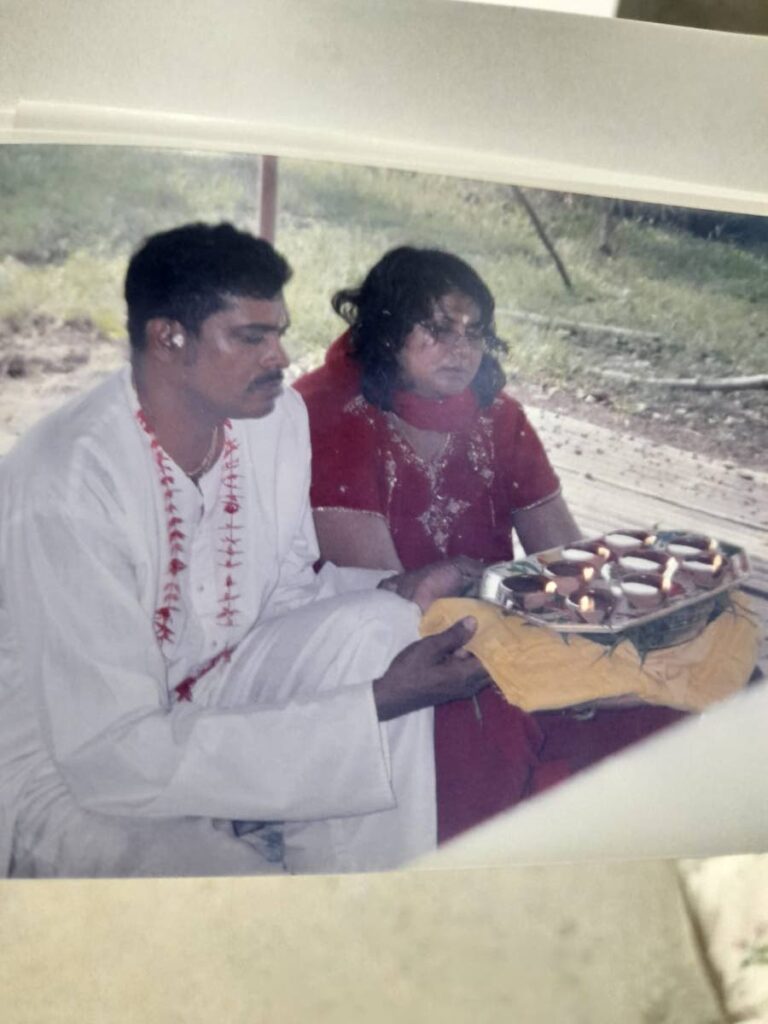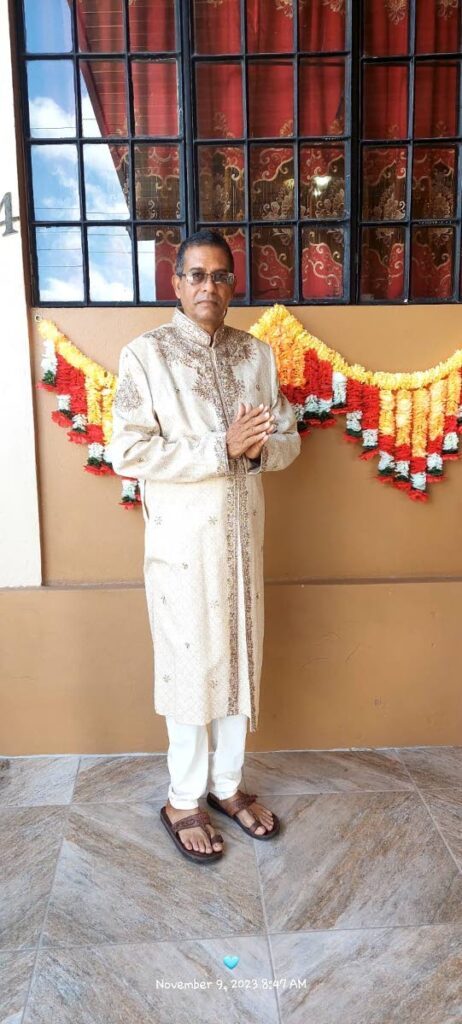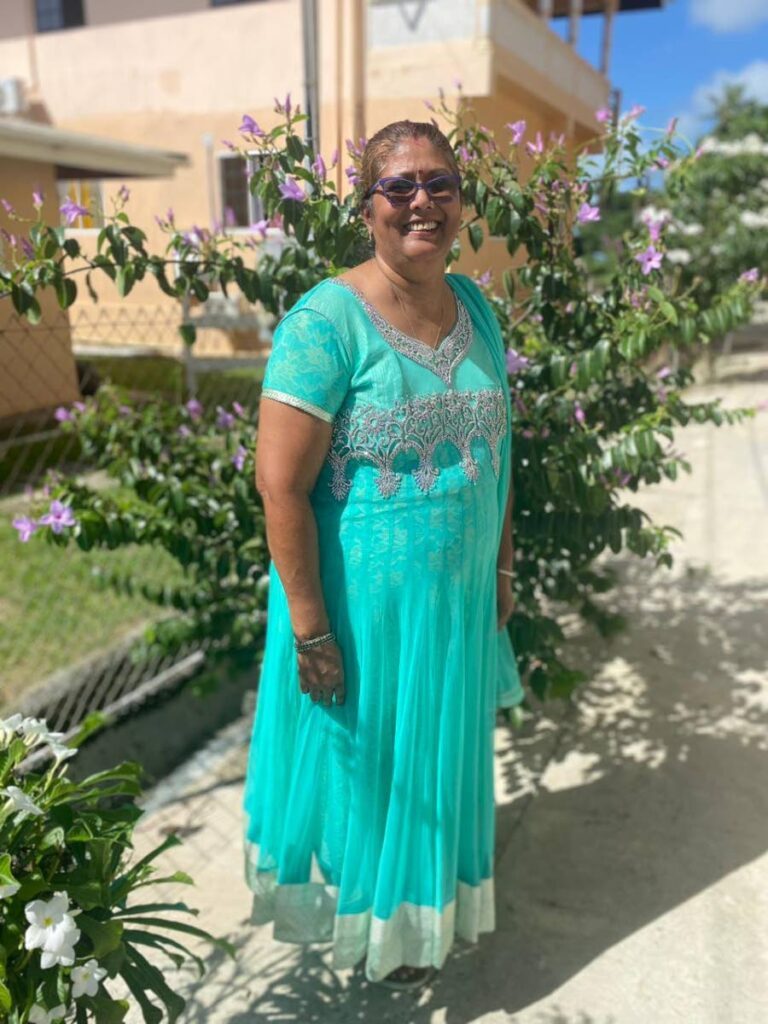Celebrating light over darkness in Tobago

DIVALI, the festival of lights, has always been a special time for Anna Sookram.
Growing up in Lime Field Village, Cedros, a predominantly East Indian community in south Trinidad, Sookram said Divali was not strictly a Hindu celebration as people of other faiths and ethnicities also joined in the observance.
She said it was not uncommon to see non-Hindu villagers helping with the preparations, lighting deyas and partaking in the delicacies.
“There was a lot of Hindus around so there was a lot of cleaning, preparation and the other children from the village would come home and help us light the deyas, whether they were Hindu or non-Hindu,” Sookram, 53, told Sunday Newsday.
She said in those days the community lived in unity.
“The villagers would eat whatever meal we prepared and lime an hour or two with us and then they go to their respective homes. Divali then was about togetherness, even among non-Hindus. Everybody lived like one.”
Sookram got married on August 1, 1993 and moved to Tobago with her husband, Anthony, four years later. Relocating permanently to the island was not their intention at that time.
“My husband came to work for three months as a crane operator on a project and fell in love with the place. We never looked back.”
Anthony later started a small contracting company with an uncle.
Sookram said establishing roots in Tobago during their early years on the island was difficult for her.
“In the beginning it was lonely because when you are in Trini you have family. Then I started working and making friends. Tobago is home now. When I go to Trinidad, I long to come back.”
But Sookram, who worked in the tourism sector, quickly observed there was a marked difference in the manner in which Divali was celebrated in Tobago.
“It is quieter than it is in Trinidad.”
With a population of just over 60,000, Tobago has a very small Hindu population. Estimates suggest there are only about 150 Hindus on the island.
Sookram said when she and her husband came to Tobago, some of her friends from Trinidad used to visit to celebrate the festival with them.
But that changed as time wore on, especially during the two years of the covid19 pandemic when the government instituted a lockdown on non-essential activity.
“I still do have friends who come across but everybody else just get caught up with life. So not many people come by me for Divali any more.”
In addition, Sookram, who lives at Stewart Avenue, Lowlands, said they no longer have elaborate Divali celebrations at their home.
“I do not work in tourism any more and my husband has reached retirement age so we close down shop. We do little stuff but nothing on a big scale.”

But over the years she observed that despite being a national festival, there are still myths among some Tobagonians about Divali, particularly in relation to the prayers that are offered when the food is prepared.
“When you hear people ask you certain things, you will get the feeling of why they don’t accept it because in the past some of them were afraid to eat our delicacies like parsad because they say we pray on it.
“After a little while, then I understand what they meant…it is the ones (food) that we take out to do offerings. Everything is a learning process.”
Sookram said she has sought to change that mindset.
“The foods that we do offerings with, we keep it for ourselves or our Hindu people who understand what it is about and we just give other people the ones that we didn’t pray on.”
She believes Tobagonians, perhaps within the past five years, have been learning more about Divali and how it is celebrated.
Today, Sookram and her husband will make their usual offering to Mother Lakshmi (one of the main goddesses of Hinduism) before preparing the sweet rice, kurma, barfi, parsad and other delicacies.
The couple will then perform a havan (ritual in which offerings of food are burnt in order to bring good luck on a special occasion), thanking Mother Lakshmi for looking over their home and asking for her continued blessing and guidance.
After the havan, Sookram will cook the food, which includes pumpkin, bodi, chataigne, mango anchar, channa and aloo, dasheen bush and pigeon peas, buss up shut, rice and other items.
“Is plenty different things and it takes up time – the earlier the better – so that when 6 o’clock comes you will be able to light a deya. Sometimes we does be dead tired but it is the joy of seeing at least one deya light. That is enough for us.”
This year, the couple plans to light about six or seven dozen deyas with wax and oil.

She said her husband lost an uncle and an aunt in July and September, respectively. So they are still observing a period of mourning.
Sookram regards the preparations for Divali as a labour of love.
“I feel wonderful, at peace. It is about blessings. For me, Divali is a cleansing of your home and an opening for blessings from Mother Lakshmi to remove darkness from whatever difficulties we may be going through in our lives. So when you cleanse you prepare for that blessings.”
Saying she has experienced Mother Lakshmi’s blessings on many occasions within her own life, Sookram said she tries her best to live by the dictates of Hinduism.
She and her husband have been members of the Tobago Hindu Society for the past 15 years. It has been in existence since 1992.
Although they are not on the society’s executive, Sookram said they try their best to attend most of its activities.
She is especially glad that Tobago’s first Hindu temple is under construction in Signal Hill.
“It will be nice to have a temple to do our prayers and offerings.”
In October 2014, the society got a deed for four lots of land from then chief secretary Orville London. It is located opposite the Scarborough General Hospital.
The sod for the mandir was turned on February 12, 2022. On that occasion, the society’s president Pulwaty Beepath thanked the National Commission for Self-Help for funding the start of the construction.
She also praised former minister of community development, culture and gender affairs Joan Yuille-Williams for her initial commitment to helping them achieve their goals.
Asked about her wish for Divali, Sookram said, “I am praying for love to come back in the hearts of people. I want love to prevail.”
She lamented the country’s worsening crime situation, noting that citizens are not safe in their own homes.
“You cannot even take a nice Sunday evening drive.”
Sookram said while everyone will not always see eye to eye, greater attempts must be made to promote togetherness in the society.
“I am not saying that everybody have to knock glass together but we need to get back some kind of love and unity among the people of Trinidad and Tobago.
“It is a sad thing when you are not safe in your own home. No matter what you go out and face during the day, your home is supposed to be your comfort zone.”
She observed even with the best security mechanisms, citizens still are not safe in their homes
“It really is a sad state, sad state. So I am hoping that mens’ hearts would change and they seek God’s blessings, some way, somehow.”


Comments
"Celebrating light over darkness in Tobago"